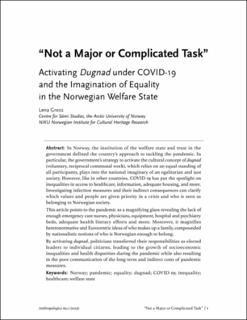| dc.description.abstract | In Norway, the institution of the welfare state and trust in the government defined the country’s approach to tackling the pandemic. In particular, the government’s strategy to activate the cultural concept of dugnad(voluntary, reciprocal communal work), which relies on an equal standing of all participants, plays into the national imaginary of an egalitarian and just society. However, like in other countries, COVID-19 has put the spotlight on inequalities in access to healthcare, information, adequate housing, and more. Investigating infection measures and their indirect consequences can clarify which values and people are given priority in a crisis and who is seen as belonging to Norwegian society. This article points to the pandemic as a magnifying glass revealing the lack of enough emergency care nurses, physicians, equipment, hospital and psychiatry beds, adequate health literacy efforts and more. Moreover, it magnifies heteronormative and Eurocentric ideas of who makes up a family, compounded by nationalistic notions of who is Norwegian enough to belong.By activating dugnad, politicians transferred their responsibilities as elected leaders to individual citizens, leading to the growth of socioeconomic inequalities and health disparities during the pandemic while also resulting in the poor communication of the long-term and indirect costs of pandemic measures. | en_US |
